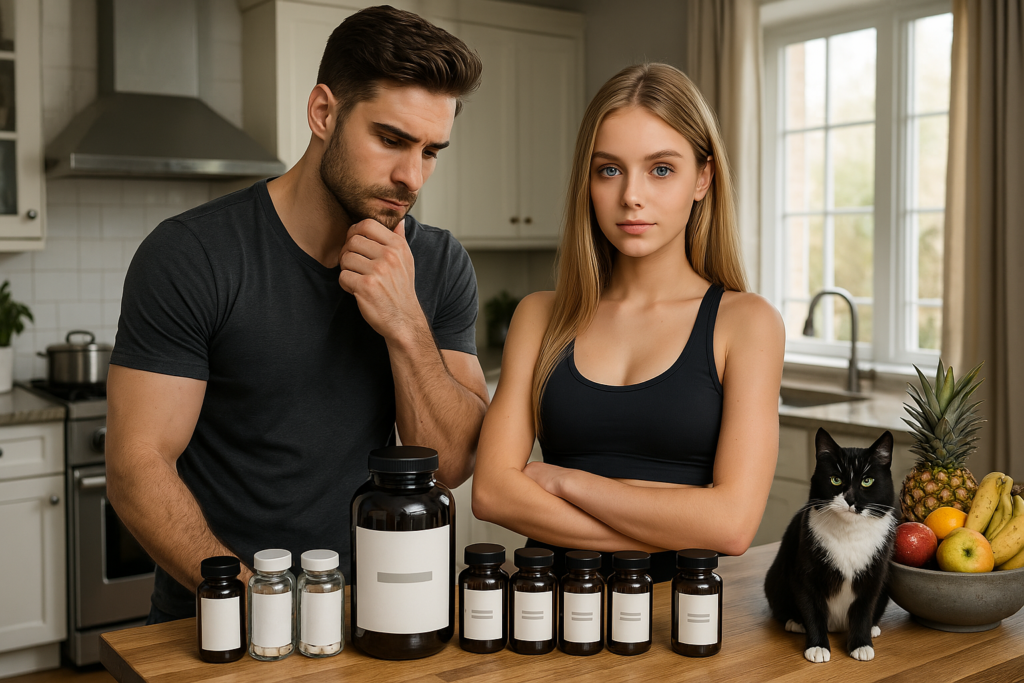The Best Supplements for Testosterone Optimization and Men’s Health

Last Updated On March 29, 2025
Testosterone replacement therapy (TRT) can be life-changing for men seeking to optimize their hormonal health, energy, and overall well-being. However, to get the most out of TRT, you need to support your body holistically. Supplements can play a crucial role in enhancing the benefits of TRT, managing side effects, and promoting long-term health.
This guide covers the best supplements for testosterone optimization that complement TRT, categorized by their specific benefits for men’s health. Whether you’re looking to improve energy levels, support the liver, enhance cardiovascular health, or reduce inflammation, these supplements can help.
Supplements to Support Hormonal Balance
Where possible, aim to include whole-food sources of these nutrients in your diet. For example, magnesium can be found in leafy greens and nuts, and fatty fish are an excellent source of Vitamin D. If dietary intake isn’t meeting your needs, supplements are the next best option.
1. Zinc
- Benefits:
- Regulates testosterone production by supporting the hypothalamic-pituitary-gonadal (HPG) axis.
- Essential for skin repair and reducing inflammation.
- Helps control oil production in the skin, reducing acne flare-ups.
- Recommended Dose: 15–30 mg daily (ensure balanced copper intake).
2. Magnesium
- Benefits:
- Enhances testosterone production by improving sleep and reducing stress.
- Supports hormonal balance, helping manage side effects like acne.
- Promotes detoxification pathways in the liver.
- Recommended Dose: 200–400 mg daily, ideally in the form of magnesium glycinate or citrate.
3. Vitamin D3
- Benefits:
- Plays a direct role in testosterone synthesis.
- Boosts immune function and supports bone health.
- Improves mood and reduces symptoms of depression.
- Recommended Dose: 2,000–4,000 IU daily; get your levels checked for precise dosing.
Supplements for Liver and Skin Health
Your liver and skin thrive when supported by a nutrient-rich diet. Foods like artichokes, dandelion greens, citrus fruits, and nuts can naturally provide many of the compounds listed below. Supplements are particularly helpful when whole food sources are not available or sufficient.
1. NAC (N-Acetylcysteine)
- Benefits:
- Boosts glutathione levels, a critical antioxidant for liver detoxification.
- Improves skin health by reducing oxidative stress.
- Recommended Dose: 600–1,200 mg daily.
2. Milk Thistle
- Benefits:
- Protects liver cells from damage caused by toxins.
- Enhances the liver’s ability to process and detoxify waste.
- Recommended Dose: 200–400 mg daily of silymarin extract.
3. Artichoke Extract
- Benefits:
- Stimulates bile production, aiding liver function.
- Supports toxin processing and reduces skin flare-ups.
- Recommended Dose: 500–1,000 mg daily.
4. Dandelion Root
- Benefits:
- Acts as a natural detoxifier to support liver health.
- Reduces skin issues caused by toxin overload.
- Recommended Dose: 500–1,000 mg daily.
5. Vitamin C
- Benefits:
- A powerful antioxidant that reduces inflammation and oxidative stress.
- Supports collagen production for healthier skin.
- Enhances liver detoxification.
- Recommended Dose: 500–1,000 mg daily.
Supplements for Cardiovascular and Metabolic Health
For cardiovascular health, aim to incorporate omega-3s through fatty fish like salmon and mackerel, and include heart-healthy whole foods like berries and olive oil. When whole foods aren’t feasible, these supplements can provide targeted support.
1. Omega-3 Fatty Acids
- Benefits:
- Reduces triglycerides and improves overall cardiovascular health.
- Decreases inflammation, which supports optimal testosterone levels.
- Recommended Dose: 1–3 grams daily of EPA/DHA.
2. Coenzyme Q10 (CoQ10)
- Benefits:
- Supports heart health by improving energy production in cells.
- Reduces oxidative stress and enhances vascular function.
- Recommended Dose: 100–200 mg daily, preferably in the ubiquinol form.
3. Berberine
- Benefits:
- Improves insulin sensitivity, helping to manage blood sugar levels.
- Reduces inflammation and supports healthy cholesterol levels.
- Recommended Dose: 500 mg 2–3 times daily before meals.
Supplements for Energy and Performance
Natural sources of these nutrients include grass-fed meats, eggs, and legumes for B vitamins, and adaptogenic herbs like ashwagandha root powder. Use supplements to complement your diet when specific needs arise.
1. Ashwagandha
- Benefits:
- Reduces cortisol levels, which can help maintain testosterone levels.
- Improves energy, stamina, and recovery.
- Recommended Dose: 500–1,000 mg daily of KSM-66 or similar extract.
2. Creatine Monohydrate
- Benefits:
- Enhances muscle strength and energy production.
- May support testosterone levels indirectly through improved performance.
- Recommended Dose: 3–5 grams daily.
3. B-Complex Vitamins
- Benefits:
- Support energy metabolism and reduce fatigue.
- Essential for red blood cell production and hormone synthesis.
- Recommended Dose: Follow label instructions; look for activated forms like methylcobalamin (B12) and methylfolate (B9).
Supplements to Reduce Inflammation
1. Curcumin (from Turmeric)
- Benefits:
- Potent anti-inflammatory that supports joint and cardiovascular health.
- May enhance testosterone levels by reducing oxidative stress.
- Recommended Dose: 500–1,000 mg daily with black pepper extract for better absorption.
2. Resveratrol
- Benefits:
- Reduces inflammation and oxidative stress.
- Supports heart health and potentially improves testosterone function.
- Recommended Dose: 150–300 mg daily.
Key Takeaways
While supplements can play a significant role in complementing TRT, it is always best to obtain nutrients from whole foods and natural sources whenever possible. For example, the sun provides Vitamin D, zinc can be sourced from oysters and pumpkin seeds, and magnesium is abundant in leafy greens and nuts. Supplements should be viewed as a secondary option to fill in nutritional gaps or address specific needs.
Incorporating the right supplements into your TRT protocol can enhance its effectiveness and support overall health. While TRT addresses low testosterone levels, supplements help fine-tune your body’s response by managing side effects, supporting vital organs, and optimizing performance.
Start by focusing on foundational supplements like zinc, magnesium, and omega-3s, then expand your regimen to address specific needs like liver health, inflammation, or energy. As always, consult with a healthcare provider before starting any new supplements, especially if you’re on TRT. By pairing TRT with these science-backed supplements, you’ll maximize the benefits and maintain optimal health for the long term.